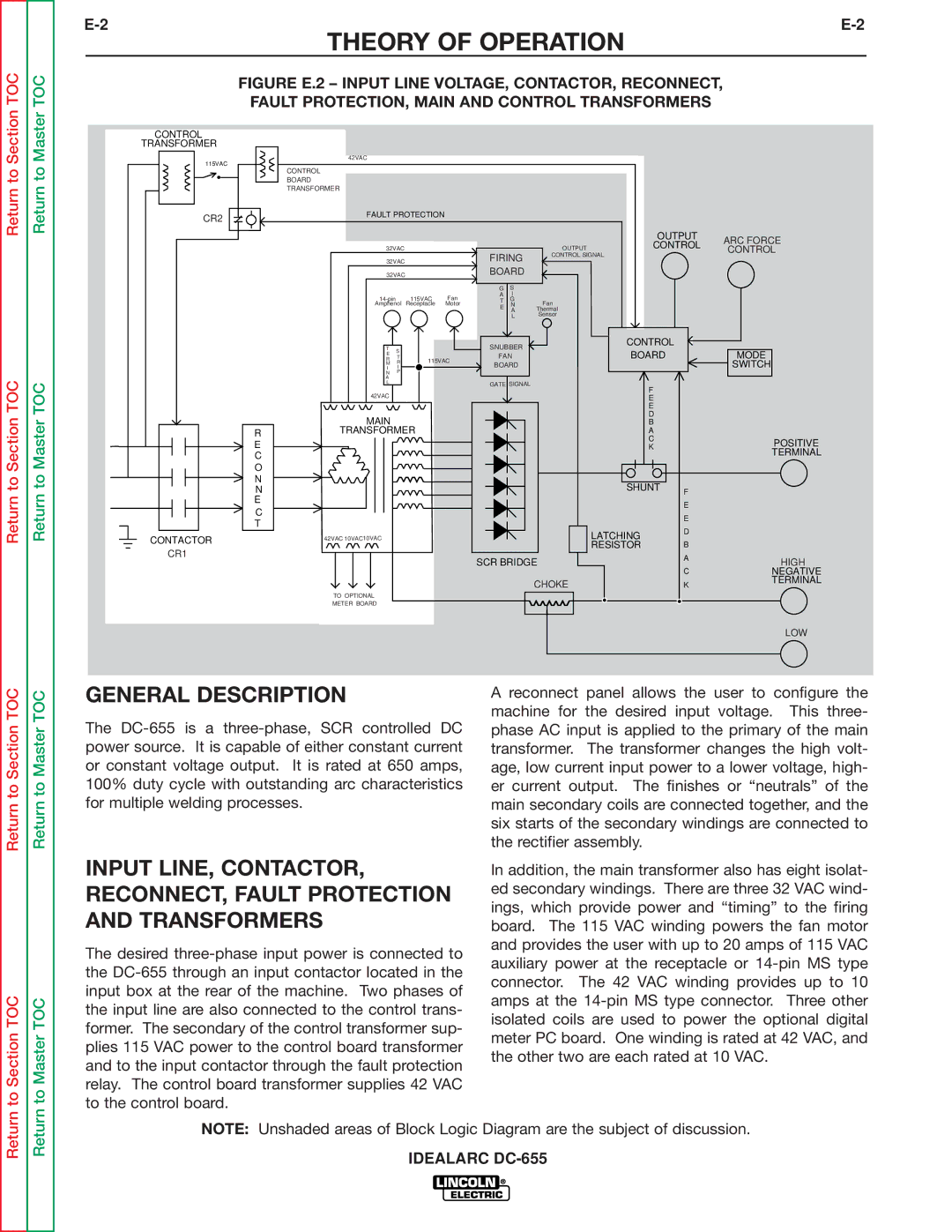
TOC
TOC
THEORY OF OPERATION
FIGURE E.2 – INPUT LINE VOLTAGE, CONTACTOR, RECONNECT,
FAULT PROTECTION, MAIN AND CONTROL TRANSFORMERS
Return to Section
Return to Section TOC
Return to Master
Return to Master TOC
CONTROL
TRANSFORMER
115VAC
CR2
R |
E |
C |
O |
N |
N |
E |
C |
T |
CONTACTOR
CR1
42VAC
CONTROL
BOARD
TRANSFORMER
FAULT PROTECTION
|
|
|
|
|
|
| OUTPUT | ARC FORCE | |
|
|
|
|
|
|
| CONTROL | ||
32VAC |
|
|
|
| OUTPUT | CONTROL | |||
|
|
|
| FIRING | CONTROL SIGNAL |
| |||
32VAC |
|
|
|
| |||||
|
|
|
|
|
| ||||
32VAC |
|
| BOARD |
|
|
|
| ||
|
|
|
| G | S |
|
|
|
|
| 115VAC | Fan | A | I |
|
|
|
| |
| T | G |
|
|
|
| |||
Amphenol | Receptacle | Motor | N | Fan |
|
|
| ||
E |
|
|
| ||||||
|
|
|
| A | Thermal |
|
|
| |
|
|
|
|
| L | Sensor |
|
|
|
T |
|
|
| SNUBBER |
| CONTROL |
|
| |
S |
|
|
| BOARD |
| MODE | |||
R |
|
| FAN |
|
| ||||
T |
|
|
|
| |||||
E |
|
|
|
|
|
|
|
|
|
M | R | 115VAC | BOARD |
|
|
| SWITCH | ||
I | I |
|
|
|
|
| |||
N | P |
|
|
|
|
|
|
|
|
A |
|
|
|
|
|
|
|
|
|
L |
|
|
| GATE SIGNAL |
|
|
|
| |
|
|
|
|
| F |
|
| ||
42VAC |
|
|
|
|
|
|
|
| |
|
|
|
|
|
| E |
|
| |
|
|
|
|
|
|
| E |
|
|
MAIN |
|
|
|
|
|
| D |
|
|
|
|
|
|
|
| B |
|
| |
TRANSFORMER |
|
|
|
| A |
|
| ||
|
|
|
|
|
|
| C |
| POSITIVE |
|
|
|
|
|
|
| K |
| |
|
|
|
|
|
|
|
| TERMINAL | |
|
|
|
|
|
|
|
|
| |
|
|
|
|
|
|
| SHUNT | F |
|
|
|
|
|
|
|
|
|
| |
|
|
|
|
|
|
|
| E |
|
|
|
|
|
|
|
|
| E |
|
42VAC 10VAC10VAC |
|
|
|
|
|
| LATCHING | D |
|
|
|
|
|
|
|
|
| ||
|
|
|
|
|
|
| RESISTOR | B |
|
|
|
|
| SCR BRIDGE |
| A | HIGH | ||
|
|
|
|
|
| ||||
|
|
|
|
|
|
|
| C | NEGATIVE |
|
|
|
|
|
| CHOKE |
| K | TERMINAL |
|
|
|
|
|
|
|
| ||
TO OPTIONAL |
|
|
|
|
|
|
|
|
|
METER BOARD |
|
|
|
|
|
|
|
|
|
LOW
Return to Section TOC
Return to Master TOC
GENERAL DESCRIPTION
The
A reconnect panel allows the user to configure the machine for the desired input voltage. This three- phase AC input is applied to the primary of the main transformer. The transformer changes the high volt- age, low current input power to a lower voltage, high- er current output. The finishes or “neutrals” of the main secondary coils are connected together, and the six starts of the secondary windings are connected to the rectifier assembly.
to Section TOC
to Master TOC
INPUT LINE, CONTACTOR, RECONNECT, FAULT PROTECTION AND TRANSFORMERS
The desired
In addition, the main transformer also has eight isolat- ed secondary windings. There are three 32 VAC wind- ings, which provide power and “timing” to the firing board. The 115 VAC winding powers the fan motor and provides the user with up to 20 amps of 115 VAC auxiliary power at the receptacle or
Return
Return
NOTE: Unshaded areas of Block Logic Diagram are the subject of discussion.
